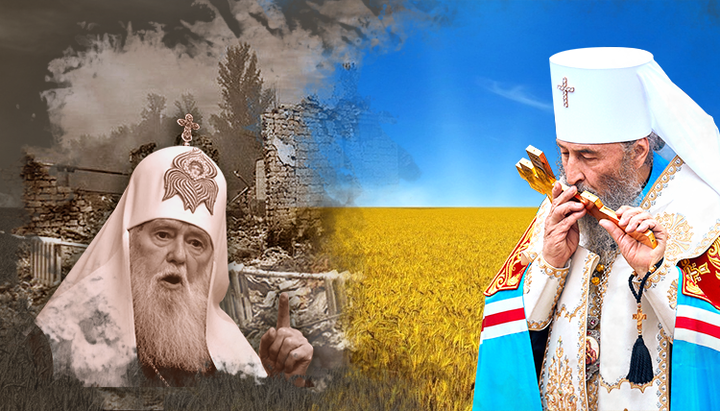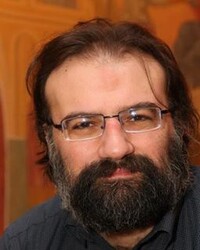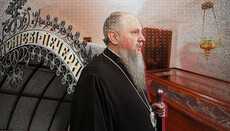Ukraine and the war in Donbass: how the Church unites the country

The only community that works for reunification of Ukraine is the Church. The forces that are working to destroy it, accuse the UOC of treachery namely for this fact.
Never-ceasing attacks on the Ukrainian Orthodox Church, “willing hands” to take the Kiev Lavra and other shrines away from the UOC are a paradoxical sight.
The only community that works for the reunification of Ukraine is the Church. The forces that are working to destroy it, accuse the UOC of treachery namely for this fact.
Any state that seeks to regain some territory under its control must inevitably try to evoke good feelings of local residents – either propagating or rendering some kind of assistance. This is not necessarily a manifestation of generosity; it is a rational effort to achieve its goals. "Be obedient to our authority: we will ensure your rights and interests better than those who control this territory now." With bayonets, you can do a lot – but you cannot sit on a bayonet, you need an effort to reconcile the inhabitants with the central authority.
This work is needed no matter how you prefer to interpret the conflict – as a civil war, one of whose sides is supported by Russia, or as an interstate conflict in which a significant part of the population in the occupied territory supports the enemy. Anyway, achieving peace requires reconciliation between the Ukrainian authorities and those of its citizens who are against it with weapons in their hands – or, at least, sympathizing with those who carry these weapons.
At the same time, the current Ukrainian authorities show complete reluctance to seek such reconciliation – moreover, they exert themselves to demonstrate to the inhabitants of Donbass that they do not consider them their fellow citizens – and even people. We can recall at least a recent statement by Aleksandr Turchinov, in which he compares the inhabitants of Donbass with Colorado potato beetles.
Why they behave this way is not entirely clear. We can assume that politicians simply do not need a region with a population that definitely will not vote for them but need an endless conflict that would allow blaming all the country's problems on the war.
Perhaps this is the nature of nationalism which constantly requires separation and hatred as fuel to be powered by. Because nationalism is, first of all, hatred of fellow citizens, and then of foreigners.
Either way, they are doing something exactly the opposite of what responsible state men, seeking a reconstruction of the country, would do in these conditions.
The schismatic Kiev Patriarchate is also working to ensure that the inhabitants of the Donbass do not even consider Ukraine as their country. The leader of the schismatics, Filaret, spoke on this topic as follows:
"The root of evil lies in those people who live in Donbas, and those who are in Moscow ... What is the lie of the separatists living in Donbass? The lie is that they do not recognize Donbass to be the Ukrainian land for centuries. The land, which has always been inhabited by Ukrainians. Just go along the villages of Donetsk or Lugansk region. An indigenous population is based there. What do they think they are, Russians or Ukrainians, if they speak Ukrainian? They are Ukrainians. And who are the separatists? These are people who came from Russia and other republics of the Soviet Union or the Russian Empire and settled on Ukrainian lands."
The version that at least part of the population of Eastern Ukraine is "those who came in large numbers" and their descendants who are not "native" and do not have the right to live on this land, is popular among nationalists who would like to obtain the land without its population. It is no accident they like Storm Operation so much, when the Croatian army simply drove out the Serbian population from the Republic of Serbian Krajina.
However, for Ukraine such a scenario is impossible for a number of reasons, both geographical and political-military. The lands could only be acquired with the population. Filaret, like other people who determine the policy of the authorities, does his best so that the population does not in any way agree to be again part of Ukraine.
Filaret, like other people who determine the policy of the authorities, does his best so that the population does not in any way agree to be again part of Ukraine.
Expressing (and encouraging) hatred towards the inhabitants of Donbass, politicians, irrespective of whether they wear jackets or cassocks, are working for the final loss of this territory.
Against this backdrop, the only significant force that relates to the inhabitants of the Donbass as their native country people is the Ukrainian Orthodox Church. Recently, during the celebration of the 1030th anniversary of the Baptism of Kiev Rus, the Church once again expressed its love and compassion for people affected by the war:
"Our special words are addressed today to those children of the Ukrainian Orthodox Church who live in the Donbass and are affected by hostilities:
Brothers and sisters! You are not alone in your trials. Our whole Church now prays, empathizes, helps and will continue to pray, empathize and help you. Your travails and your pain is a pain in our hearts. According to the Apostle Paul, "one member suffers, all the members of the body, that is, the Church of Christ, suffer" (1 Corinthians 12:26). We express our gratitude to the archpastors, pastors, monastics and all laymen of that part of Donbass where the flame of war is blazing, for your courage, for staying with your flock, for patiently enduring the trials that befell you. We pray to the All-Merciful God and we believe that the war will soon end and God will wipe every tear from your eyes (Revelation 21, 4)."
And it's not just kind words – although words are very important, too. The Church provides effective assistance to people in the conflict zone. One recent example is that the Church handed over nearly 40 tons of humanitarian aid to the residents of the east of Ukraine as part of the "Mercy and Reconciliation" project.
If politicians behaved the way the Church does, i.e. they would show mercy and seek reconciliation with the inhabitants of the Donbass, – the situation would develop quite differently.
The battle for the minds and hearts of people in Eastern Ukraine would not have been lost from the very beginning. If the "leaders of the free world" made every effort to prevent the shelling of cities and villages, if they tried to show goodwill towards the population, people would be much more inclined to trust them and their plans for Ukraine. However, it would be strange for Western politicians to demand something – after all, Eastern European poor people are just as alien to them as the poor people of Iraq, Libya or Latin America. How people will live in the east, as well as in the west of Ukraine, and whether they will live at all, worries Western politicians solely from the point of view of their and only their interests.
However, for the people who connect their destiny with Ukraine, it is very important to achieve reconciliation between its citizens. And here is the point where the Church is working on reconciliation, working for the future of the country.
Because the Church, by its nature, gathers people into the Kingdom of God. People of different backgrounds, language, political preferences. The Church is the love of God, revealed to the whole world, the hand of help and reconciliation extended to all. As the Holy Apostle Paul says, "because God in Christ reconciled the world to Himself, not imputing offenses on people, and gave us the word of reconciliation. So we are messengers in the name of Christ, and as if God himself exhorts through us; on behalf of Christ we ask: be reconciled to God." (2 Corinthians 5, 19-20)
This message of reconciliation with God and with each other will inevitably stir up intense hostility among those who live by war and hatred. Yet this is the message, entrusted to the Church by God, and following it is one of the signs that distinguishes the Church from secular communities.












